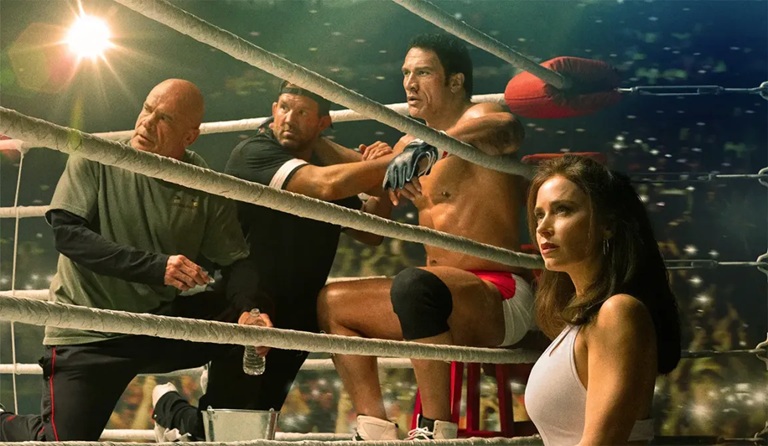Although not every film must “have something to say” to necessitate its existence, those without any grander message or meaning have an extra burden. They must be, you know, “good.”
The Smashing Machine is not very good. It also seems to be either about how an above-average athlete helped bring the “art” of getting kneed in the face repeatedly into the mainstream or about how “women be crazy, am I right?” But the Rock wears a prosthetic nose and a wig, so he’ll probably get nominated for best actor.
Writer/director Benny Safdie brings us the “true story” of Mark Kerr (Dwayne “The Rock” Johnson/Dwayne “The Rock” Johnson’s prosthetic nose and wig). Kerr was a “pioneer” for what would go on to become the Ultimate Fighting Championship (UFC), which is now a beloved sporting franchise run by a man who is funding a competition where people slap each other in the face very hard. The Smashing Machine weaves Kerr’s struggles outside the ring with his battles inside of them. It does so while defiant jazz music plays. Because of course it does.
You may think that Kerr’s biggest hurdle was his crippling opioid addiction. You’d be wrong, of course, because his biggest hurdle was Dawn Staples (Emily Blunt). At least, as the movie tells it. Who knows what actually happened in the clearly troubled real-life relationship, but the film’s lopsided analysis sure paints Dawn out to be more of the villain. It’s basically like Rocky if instead of yelling “Yo, Adrian, we did it!” the hero just yells obscenities at her.
Although The Smashing Machine doesn’t paint Kerr out to be a saint, it does include text that proclaims “HIS NAME WAS MARK KERR” and at least lightly recommends that he be canonized for bravely bringing a profitable bloodsport into the limelight. It also goes out of its way to show the professional fighter as soft spoken and kind, while Dawn gets ripped on margaritas or whines/nags/yells in literally every scene she’s in.
Johnson is good here. He can be good. Very good, honestly. It makes his filmography that much more upsetting, but it is nonetheless true. He has always had an effortless, colossal charisma that he uses on silly and pointless things. Let’s hope this obvious Oscar bait is the gateway to less Santa Claus-centric action movies and more Southland Tales. Side note: You almost certainly do not know what that weird and forgotten movie is and should absolutely watch it as soon as possible. For her part, Blunt is an exceptional actress who deserves better than “his wife” roles, whether said husband invented the atomic bomb or popularized concussions or both.
As a character study, The Smashing Machine is far too obsessed with the UFC’s rise. As a celebration of the UFC’s rise, it feels weird to focus on someone who, best-case scenario, was pretty good and had a messed up personal life. The end result is a laborious biopic, arguably cinema’s worst genre, that has an icky/misguided message and more jangly jazz than anyone should ingest in one sitting.
Grade = D
Other Critical Voices to Consider
Kofi Outlaw at ComicBook.com says “Even with its unorthodox third act and abrupt endpoint, The Smashing Machine manages to say something significant about how the fight in the ring is really just an extension of the fight inside us, and even adds a touching epilogue about what that journey has meant to the actual Mark Kerr.”
Siddhant Adlakha at Inverse says “The result is an enrapturing sports drama where the very act of intimacy — of knowing oneself, and truly seeing oneself in moments of failure — is the most difficult thing in the world, and the most rewarding.”
Marisa Carpico at The Pop Break says “as strong as The Smashing Machine is as a showcase for what an outstanding actor Johnson can be with the right material, it’s still worth questioning whether it achieves a greater truth or emotional resonance than the documentary that inspired it. Because Safdie takes so much of that film’s structure and drama to make his own, it can feel almost like a dramatization.”

